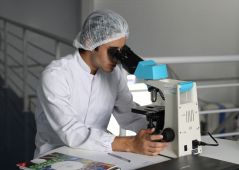KS4 Working Scientifically

Learning how to work with different types of inquiry and how to develop this within and outside of the classroom.
This page provides resources covering the subject of working scientifically, covering topics such as:
- Development of scientific thinking - how scientific methods and theories develop over time, developing scientific explanations adn understanding, applications of science, evaluating practical science and the wider societal context, and recognising the importance of peer review results and science communication.
- Experimental skills and strategies - using scientific theories and explanation developing and testing hypotheses, application of knoweldge via use of techniques, conductng experiments and recognising applying the relevance of knoweldge, evaluating methods and recommending future investigations.
- Analysis and evaluation - applying, presenting and analysing data using appropriate methods, representing mathematical and statistical analysis, interpreting obeservations and other data drawing objective conclusions, presenting explanations, and communicating the scientific rationale determining the reasoned conclusions
- Vocabulary, units, symbols and nomenclature - developing scientific knowledge, vocabulary and nomenclature, understadning how they are determined, and using appropriate number of significan figures in calcualtions
More Information
(Please note the links below may not reflect all the topics listed above)
Browning reactions and dextrinisation - http://www.compoundchem.com/2015/01/27/maillardreaction/
Processing and vitamin content in cabbage - http://www.rsc.org/learn-chemistry/resource/res00000569/the-hunt-for-vitamin-c-the-effect-of-cooking-processes-on-the-vitamin-c-content-of-cabbage
Preservatives - http://www.nuffieldfoundation.org/practical-biology/preserving-food
Cauliflower cloning - http://www.saps.org.uk/secondary/teaching-resources/706
Diet and recipe calculations - http://explorefood.foodafactoflife.org.uk/
Energy in food - http://www.nuffieldfoundation.org/practical-biology/how-much-energy-there-food
Extracting oils from plants and nuts - http://www.saps.org.uk/secondary/teaching-resources/839-extracting-oil-from-plants-gcse
Test your taste - http://faculty.washington.edu/chudler/pdf/tastetg.pdf
The effect of cooking on vitamin C in cabbage | 16–18 years | Resource | RSC Education
Yeast fermentation - https://www.grainchain.com/sites/default/files/14-16%20Yeast%20experient%20worksheet.pdf


